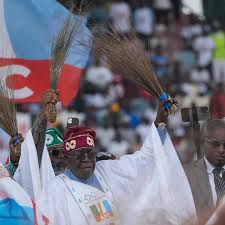Former Secretary to the Government of the Federation (SGF), Boss Mustapha, stirred fresh controversy on Wednesday, July 09, when he downplayed the contribution of President Bola Ahmed Tinubu and the Southwest to the All Progressives Congress (APC)’s historic 2015 victory. Speaking at the presentation of a book authored by Mallam Garba Shehu, Mustapha’s remarks surprised many, as he is not known for controversial public statements.
At the event, Mustapha suggested that APC’s 2015 win was largely built on the foundation of General Muhammadu Buhari’s consistent 12 million votes from the North. He described the merger as only adding 3.2 million votes to Buhari’s existing electoral strength. That perspective, however, raised eyebrows among attendees, who saw it as an attempt to rewrite history and dismiss the roles of others—particularly Tinubu and the Southwest.
Observers argue that Mustapha’s account undermines the joint efforts of political leaders who sacrificed their parties, ambitions, and personal interests to build a united opposition that defeated the Peoples Democratic Party (PDP) after 16 years of dominance. By presenting the merger as a numerical footnote to Buhari’s previous attempts, Mustapha seemed to ignore the full story of APC’s formation and success.
Before 2015, Buhari had contested and lost presidential elections three times—in 2003, 2007, and 2011. Despite his popularity in the North, he was unable to gather sufficient support across other regions. In 2003, he ran with Chuba Okadigbo but lost to President Olusegun Obasanjo. In 2007, he ran with Edwin Ume-Ezeoke and was defeated again. In 2011, he partnered with Pastor Tunde Bakare under the Congress for Progressive Change (CPC), but the outcome was the same. Buhari polled 12.2 million votes in 2011, yet lost to President Goodluck Jonathan of the PDP, who scored over 22 million votes.
It became clear that Buhari alone could not win a presidential election without forging partnerships beyond the North. This realisation led to serious consultations between Tinubu’s Action Congress of Nigeria (ACN), Buhari’s CPC, the All Nigeria Peoples Party (ANPP), a faction of the All Progressives Grand Alliance (APGA), and some breakaway members of the PDP, forming what is now known as APC.
Tinubu, a major political figure in the Southwest, played a central role in bringing the parties together. As the national leader of ACN and a former Lagos State Governor, he mobilised resources, talent, and legal expertise to achieve the merger. When Buhari doubted whether such an alliance could work, Tinubu sent a team of legal experts to persuade him, eventually convincing the general to join forces.
Although Tinubu had been considered for the role of running mate in 2015, religious sensitivity forced him to step down. Nevertheless, he remained committed to the project and supported the eventual emergence of Professor Yemi Osinbajo as vice-presidential candidate. His decision not to abandon the cause helped sustain APC’s unity and national appeal.
The merger marked a turning point in Nigerian political history. APC, formed through sacrifice and vision, became a truly national party. In 2015, Buhari won the presidency with 15.4 million votes, defeating Jonathan who got 12.8 million. It was the first time an incumbent president was defeated in Nigeria’s democratic history.
Tinubu’s financial support and political networks were critical to APC’s campaign. Although he did not hold any formal position in Buhari’s administration, his loyalty to the party never wavered. By 2017, even Buhari’s inner circle recognised the necessity of Tinubu’s continued support for the president’s re-election. Former Minister of Transportation Rotimi Amaechi and Governor Nasir el-Rufai, during consultations in Lagos, were told bluntly by Southwest stakeholders to return to Tinubu if they wanted the zone’s backing.
Buhari later acknowledged Tinubu’s strategic influence by attending his birthday celebration in Lagos and praising him as a visionary political leader.
While it is true that many figures contributed to the success of APC, the attempt to belittle Tinubu’s role stands on shaky ground. Without cross-regional collaboration, APC would not have been strong enough to defeat PDP. The North’s votes were vital, but not sufficient. It took unity, strategy, and sacrifice to make the dream of power shift possible.
Tinubu’s eventual emergence as President in 2023 is, in many ways, a vindication of his role in 2015. His belief in power rotation and national unity, despite being sidelined after Buhari’s victory, reflects a level of political maturity uncommon in Nigeria’s political space.
While no individual can claim sole credit for APC’s rise, history must be told with honesty. Attempts to distort the facts may serve narrow political interests, but they do a disservice to the truth and risk further divisions in a party already struggling to maintain internal harmony.
